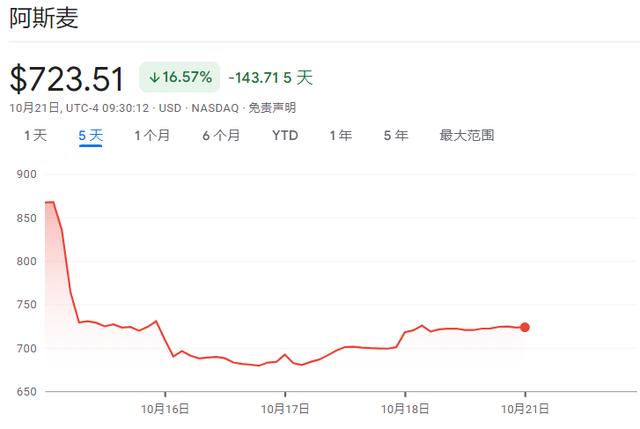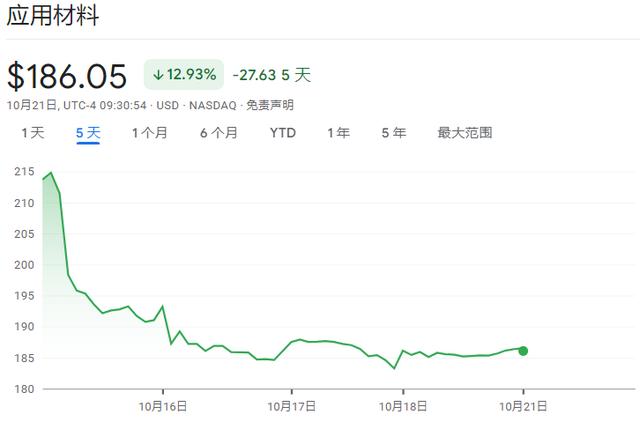The $530 billion semiconductor industry is witnessing a widening divide: Companies that ride the artificial intelligence wave are thriving, while those that miss out are being left far behind. Judging from the preliminary results of the third quarter earnings season of U.S. stocks, this gap may soon turn into an abyss.
“Without AI, the (chip) market would be very bleak,” Christophe Fouquet, chief executive of Dutch chip manufacturing giant ASML, said on a conference call last week.
ASML's third-quarter orders were only half of market expectations. Due to weak demand in non-AI fields, the company lowered its 2025 sales guidance. The performance shock caused ASML to plunge more than 16% last week.
Not only that, ASML’s financial report triggered a new round of market concerns about the health of the chip industry. The Philadelphia Stock Exchange Semiconductor Index plummeted last week. Applied Materials, the largest chip equipment manufacturer in the United States, fell by more than 12%. KLA and Lam Research also both plummeted.

Despite the positive signals released by AI, key markets such as personal computers and automobiles have not yet emerged from the cold winter . Gabelli Funds analyst Ryuta Makino predicts that the differentiation of the chip industry will continue until at least 2025.
We should expect this divergence to continue, as it’s entirely safe to assume that AI is behind it all.
Among the chip stocks that have announced financial reports, in addition to ASML, there are two traditional chip giants that have fallen behind in the AI competition:
Intel is cutting costs and delaying construction of new factories to cope with falling sales and mounting losses. Samsung made a rare apology to investors after delayed shipments of HBM3E high-bandwidth memory chips led to disappointing Q3 results.
This week, investors will be paying close attention to earnings reports from Texas Instruments, which is due to report after the bell on Tuesday Eastern Time . Its analog chip products are used by a wide range of customer groups.
Taken together, the road ahead is tough for chipmakers, many of which saw their stocks reach record highs earlier this year. Some traders have begun to lose patience and sell stocks.
Compared with the above giants, "we are more cautious about other semiconductor equipment companies," Cantor Fitzgerald analyst CJ Muse wrote in a research note:
We had thought that long-term front-runners like ASML would fare better. Obviously, our assumption is wrong.
Lam Research will announce its earnings on October 23, KLA will announce on October 30, and Applied Materials will announce on November 14. Muse said he expects these stocks to have more room to fall.
While the performance of traditional giants such as ASML is under pressure, chip companies that have benefited from soaring AI spending have become the biggest winners.
According to media estimates, Microsoft, Google parent company Alphabet, Amazon and Meta Platforms invested more than $50 billion in capital expenditures in the second quarter, most of which went to computing component manufacturers. Most of these giants said they plan to invest more funds in the next few quarters to expand AI infrastructure.
AI chip sales are expected to reach $168 billion this year and jump to $245 billion by 2025, according to Solita Marcelli, chief investment officer for the Americas at UBS Global Wealth Management.
Marcelli wrote in a research note last week:
We continue to be bullish on the strong growth prospects for AI chips and will pay close attention to management's guidance on future demand in the coming days and weeks.
There is no doubt that the biggest winner in this AI wave is NVIDIA. Its stock price hit a new historical record last week. It has soared 175% this year, once surpassing Apple to become the company with the highest market value in the world.
Nvidia will announce its new quarterly financial results in November. Some people believe that NVIDIA's Q3 performance may be "facing difficulties" considering its expensive stock price and high base for the same period last year. In the last quarter's financial report, Nvidia's revenue guidance for the third fiscal quarter was US$32.5 billion, which was in the middle of the expected range (US$32 billion-33 billion), which fell short of the highest expectations and also released a signal that performance growth may slow down.In addition to financial data, some analysts said that investors will also pay close attention to Nvidia's AI investment scale and the latest news about Blackwell chips.
It’s worth noting that even some winners are not immune to weakness in the non-AI market, such as custom chip giant Broadcom , whose stock price plummeted last month after its non-AI business missed expectations.